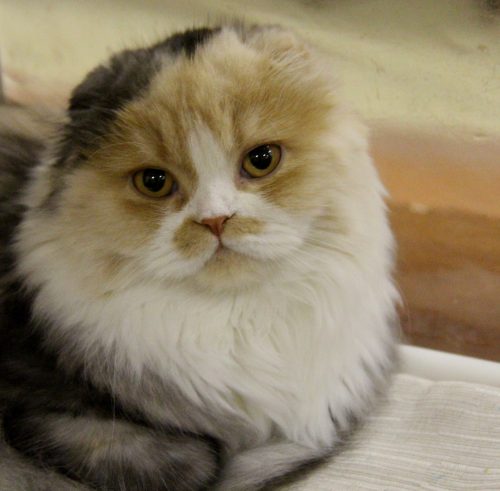How to Help Ensure Your Cat Has a Long and Happy Life
 Cats are funny, temperamental creatures—that’s why we love them so much, after all! Quirky feline behavior makes them the second most popular pet in America, with over 30% of households owning at least one cat. Some cats are shy; others are outgoing; still more have widely varying moods. While it may seem difficult to know if a cat is happy unless they’re actively purring on your lap, there are things every cat owner can do to ensure their companion cat has a long, healthy, and most of all happy life.
Cats are funny, temperamental creatures—that’s why we love them so much, after all! Quirky feline behavior makes them the second most popular pet in America, with over 30% of households owning at least one cat. Some cats are shy; others are outgoing; still more have widely varying moods. While it may seem difficult to know if a cat is happy unless they’re actively purring on your lap, there are things every cat owner can do to ensure their companion cat has a long, healthy, and most of all happy life.
A good place to start is to give your cat a bit of space. Sure, it may seem like your cats prefer your newspaper or the PJs you tossed onto the floor to a fancy bed, but they appreciate having a place to themselves that no one else can go. Whether it’s teaching your kids to leave the cat alone when she darts under the bed or treating your big, fluffy tabby to one of those cat towers with levels, tunnels, and a scratching post, your cat will appreciate having something they know is just for them.
Likewise, while your cat may prefer batting at the window shade pull cord to anything you bring home from the pet store, it’s a good idea to get your cat a toy every once in a while. Yes, a new one—cats get bored of toys just like kids do, so hiding your cat’s old toys and occasionally bringing them out one at a time, or bringing home a new one, is a great idea. Not only will it improve your cat’s mood by occupying their mind, it’ll get them some healthy exercise—and be entertaining for you to watch! If your cat likes catnip, a treat scented of catnip can really get them excited (and getting a catnip spray may re-interest your family feline in toys he’s grown tired of).
Instead of scolding your cat when she scratches up the couch, you should also get your cat a scratcher. Many cats love the inexpensive corrugated cardboard scratchers you can get just about anywhere—even the grocery store! Placing one of those by your cat’s preferred scratching spot may help them decrease or even stop scratching your furniture entirely. Scratching is a natural behavior in cats, as it sharpens their claws and uses muscles in their legs and back—so help them scratch appropriately!
In the end, taking care of your cat’s basic needs is the best way to keep them happy and healthy. Give them high quality food for dinner, in a sensible portion. Make sure they have lots of clean water to drink. Scoop their litter box regularly, and make sure you don’t use cleaning products around that area that have a strong or chemical smell. Give them a monthly flea treatment if they need it, and take them into their veterinarian in the greater Philadelphia area for yearly checkups.
Cats often “suffer in silence,” so it’s good to know what’s going on with them in case a visit to a specialty veterinary healthcare hospital is needed.
Sometimes cats need access to a specialty veterinary healthcare hospital just like VRC. Located in the greater Philadelphia area, we offer specialty services to cats and their owners.






 Email
Email January 2nd is National Pet Travel Safety Day, so there’s no better time to talk about the best ways you can keep your dog or cat safe when traveling with them. After all, many of us travel during December, when we go to visit friends and family for the holidays—and sometimes, we take our pets along with us to avoid leaving them home alone for too long, or to avoid the expense of boarding them. Obviously there are all sorts of ways to travel, and all sorts of ways to travel with your pets. You can take them on airplanes, in your car with you, or even on the train or bus. But today we’re going to focus on the most common way people travel with their pets: by car.
January 2nd is National Pet Travel Safety Day, so there’s no better time to talk about the best ways you can keep your dog or cat safe when traveling with them. After all, many of us travel during December, when we go to visit friends and family for the holidays—and sometimes, we take our pets along with us to avoid leaving them home alone for too long, or to avoid the expense of boarding them. Obviously there are all sorts of ways to travel, and all sorts of ways to travel with your pets. You can take them on airplanes, in your car with you, or even on the train or bus. But today we’re going to focus on the most common way people travel with their pets: by car. Autumn is coming to an end, and with it, the mild temperatures we’ve enjoyed while taking our dogs on walks through the park, or letting our cats stroll around our yards. Yes, the mercury is dropping—we’re starting to see lows in the 30s and the 40s, and the weather reports are calling for above average snowfall and lower temperatures than normal. We’ll be getting our cold weather gear out of storage soon, and warming up the cars before we hit the road to work in the morning. But how should we prepare for the way cold weather affects our companion animals?
Autumn is coming to an end, and with it, the mild temperatures we’ve enjoyed while taking our dogs on walks through the park, or letting our cats stroll around our yards. Yes, the mercury is dropping—we’re starting to see lows in the 30s and the 40s, and the weather reports are calling for above average snowfall and lower temperatures than normal. We’ll be getting our cold weather gear out of storage soon, and warming up the cars before we hit the road to work in the morning. But how should we prepare for the way cold weather affects our companion animals? The holiday season seems to be defined by meals. We fill our homes with the scents and tastes of the delicious holiday dinners we grew up eating with our friends and family. That’s what the holidays are all about, for many of us—making new memories over a table spread with things we’re thankful for.
The holiday season seems to be defined by meals. We fill our homes with the scents and tastes of the delicious holiday dinners we grew up eating with our friends and family. That’s what the holidays are all about, for many of us—making new memories over a table spread with things we’re thankful for.
